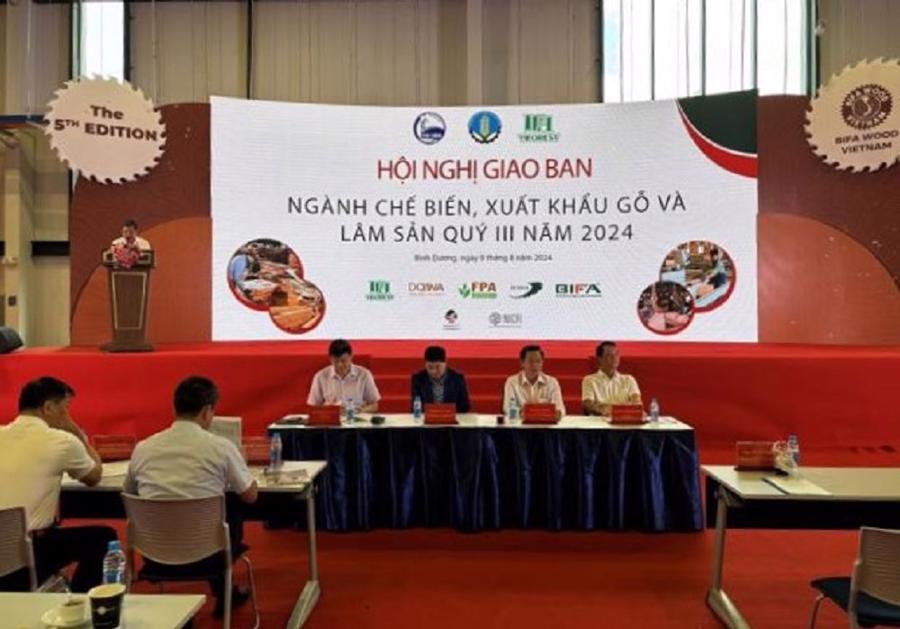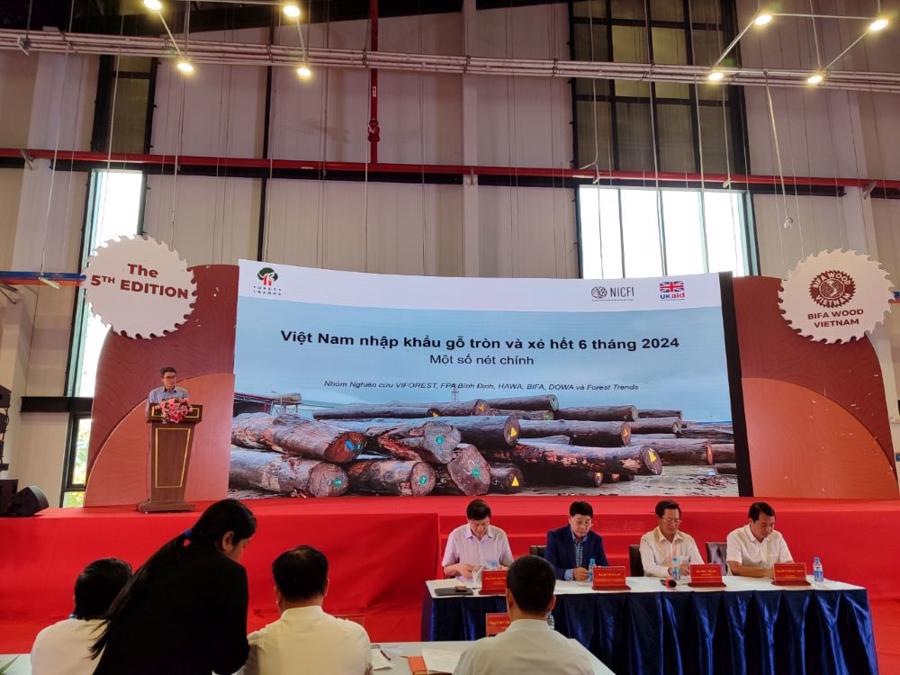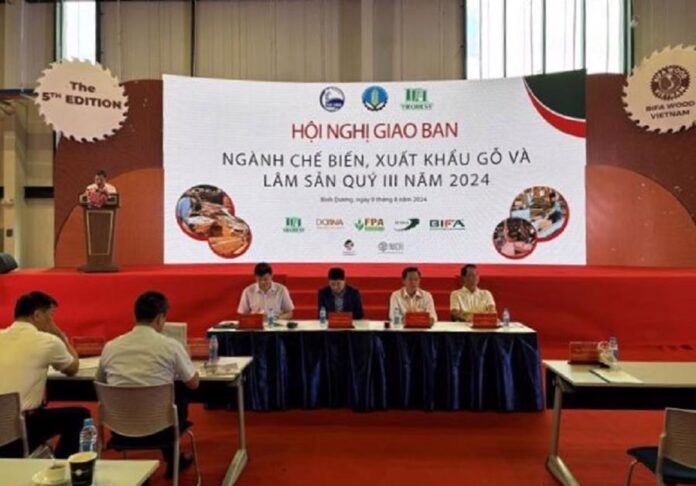On August 9, 2024, the Ministry of Agriculture and Rural Development, in coordination with the People’s Committee of Binh Duong province and the Vietnam Timber and Forest Product Association (VIFOREST), organized a “Conference on the wood processing and export industry in the third quarter of 2024” in Binh Duong province.
WOOD INDUSTRY ACHIEVES OVER $7.8 BILLION IN SURPLUS
Speaking at the conference, Mr. Trieu Van Luc, Deputy Director of the Department of Forestry (Ministry of Agriculture and Rural Development), said that in the first seven months of 2024, the export value of wood and forest products was estimated at $9.361 billion, reaching 61.5% of the annual plan and a 20.5% increase compared to the same period in 2023. This included $5.967 billion from wood products, a 22.2% increase; $2.785 billion from timber, a 20.9% increase; and $609 million from non-timber forest products, a 4.6% increase.
On the other hand, the import value of wood and wood products in the first seven months of 2024 was estimated at $1.5 billion, a 22.3% increase compared to 2023.
Thus, with these results, the industry’s surplus for the first seven months is estimated at $7.86 billion.

Commenting on the industry’s export situation for the last five months of the year, Mr. Luc stated that, according to cyclical factors, orders, especially for wooden furniture, tend to increase significantly towards the end of the year when the real estate market enters a phase of completion, renovation, and interior decoration to welcome the new year.
In addition, the wood processing industry and wood product exporters have several advantages, including a skilled labor force, an abundant supply of raw materials, and the ability to produce traceable products from legally imported timber.
“In the first seven months, the export markets for wood and wood products were: the US with $5.019 billion, up 24%; China with $1.22 billion, up 37.92%; Japan with $949 million, down 2.73%; South Korea with $472 million, down 1%; and the EU with $555 million, up 22.44% over the same period last year.”
Mr. Trieu Van Luc, Deputy Director of the Department of Forestry.
“The global market demand for wood and wood products is approximately $230 billion per year. Meanwhile, Vietnam’s wood and wood product exports currently account for just over 6% of the global market share, so there is ample room for businesses to expand and develop their market share,” said Mr. Luc.
However, it is predicted that the world will continue to experience complex and unpredictable changes, with increasing risks and uncertainties. The global economy in 2024 is under pressure from high-interest rates, trade tensions, military conflicts, political upheavals, and a projected growth rate of 2.6%, lower than the 3.1% growth rate in 2023.
At the same time, Vietnam’s main wood export markets, including the EU, the US, Japan, and South Korea, are facing economic challenges and trade protectionism. Rising sea freight rates have also led to increased prices for wood raw materials, with some types of wood seeing a 40% increase in import prices compared to the previous year. This has impacted the cost of finished products.
Additionally, VAT refund procedures for wood chip, plywood, and other wood product manufacturers remain challenging due to time-consuming tax administration procedures that require verification with forest owners.
PROPOSAL TO DISCOURAGE FDI INVESTMENT IN THE WOOD INDUSTRY
Up to this point, the United States has not recognized Vietnam as a market economy. As a result, according to Mr. Do Xuan Lap, Chairman of VIFOREST, Vietnamese businesses exporting goods to the United States will continue to face discrimination in anti-dumping and countervailing duty investigations. The actual production costs of Vietnamese enterprises are not recognized, and a “substitute value” from a third country is used to calculate the dumping margin.
“The number of lawsuits may continue to increase in the coming time as the US economy and the world are in crisis, the US production sector is in difficulty, and especially in the context that the US government needs the support of voters in the upcoming presidential election,” said Mr. Do Xuan Lap.
“Regarding the rules of origin for preferential tariffs under EVFTA, enterprises need to pay attention: when the origin is suspected, the customs will request the importer to pay a guarantee tax, and this tax will be refunded when there is a result of verifying the accuracy of the set of documents on the rules of origin according to the regulations in EVFTA.”
Mr. Do Xuan Lap, Chairman of Vietnam Timber and Forest Product Association.
With the EU market, the EU Timber Regulation (EUDR), which will come into effect in December 2024, will create difficulties for wood and wood product exporters in terms of compliance.
In addition, Germany’s Supply Chain Due Diligence Act will indirectly affect Vietnamese exporters. Importers may request additional certifications from Vietnamese businesses regarding product origin, labor conditions, wages, and factory waste management.
Regarding solutions for the wood industry in the coming period, Mr. Do Xuan Lap suggested improving businesses’ competitiveness by focusing on five main pillars: (i) Technical and technological solutions in production; (ii) Emission reduction and green products; (iii) Management solutions with a priority on digital transformation; (iv) Trade promotion with a focus on market development; and (v) Establishing internal monitoring standards within enterprises.

To enhance the industry’s trade defense capabilities, VIFOREST requested the Ministry of Agriculture and Rural Development, the Ministry of Industry and Trade, and other relevant government agencies to support and guide businesses in responding to trade remedy investigations by the United States.
There should also be a coordination mechanism to update information on policy changes in the key export markets for Vietnamese wood products and provide forecasts, warnings, and other trade-related information.
Mr. Lap suggested that the authorities develop policies to support trade promotion activities for the wood industry, helping businesses have more opportunities to introduce and promote Vietnamese wood products in export markets. He also requested that the Ministry of Planning and Investment develop policies to discourage FDI enterprises from investing in wood product manufacturing projects in countries that have been subject to anti-dumping duties by third countries.
The Ministry of Agriculture and Rural Development should aim to develop mechanisms to support programs and projects for sustainable forest management certification nationwide, rather than small-scale initiatives by individual businesses or organizations.
Regarding fire prevention and control, he requested that the Fire Prevention and Control Department of the Ministry of Public Security provide guidance and support to Vietnamese wood processing factories that were built before the new fire prevention and control decree to ensure uninterrupted production and avoid bankruptcy.
Thanh Hóa’s Foreign Affairs: Boosting Investment, Commerce, and Tourism
As part of the 2024 plan, the leaders of Thanh Hoa province will collaborate with international organizations, agencies, and businesses both within and outside the country to attract and promote investments. Additionally, the province will actively participate in major events to showcase and highlight the local potential and strengths in terms of investment, trade, and tourism…









































